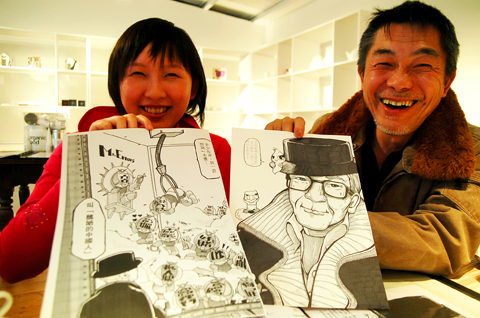A comic-strip version of The Ugly Chinaman, a popular book by human rights activist and writer Bo Yang (柏楊), will be soon be published.
In The Ugly Chinaman, Bo Yang presented controversial, in-depth criticism of Chinese culture, depicting the Chinese as dirty, noisy and vainglorious brown-nosers who are incessantly fighting amongst themselves.
The book came as a shock when it was first published in Taiwan in 1984, said Chang Hsiang-hua (張香華), Bo Yang’s wife.

PHOTO: HSIEH WEN-HUA, TAIPEI TIMES
Although the book was banned in China until 2000, underground copies had spread as far as the Xinjiang region and Heilongjiang Province by then, she said.
In last August, Bo began planning a comic version of the book, saying that it could reach out to young people today, who tend not to read.
The publisher of the comic edition, Hsu Jung-chang (徐榮昌), said he had long been a fan of Bo’s original work.
Jung said he admired Bo’s faculty for critical analysis and that the author’s sharp insight had not faded over the decades.
Cartoonist MoMo — who was born in 1980 and is 60 years younger than Bo — was given the task of drawing the comic version.
MoMo said that the age difference meant that she could reinterpret the classic book from the perspective of a younger generation. She hopes to make the comic version a tool of civic education across generations and national boundaries and pass on Bo’s gift of critical thinking to others.
MoMo, who has worked as a cartoonist for 20 years, has never published a complete comic book.
“When I agreed to take the job, I didn’t know who Bo Yang was and didn’t know how serious it was,” she said.
The only thing that Bo Yang asked from her was to “make it really funny and make him look stupid,” she said.
In the illustrated version of The Ugly Chinaman, Bo will appear as one of the characters, who often argues with others.
Contemporary issues, including campus shootings in the US and the Japanese whaling industry, will be discussed in the book alongside the orginal themes of the problems with Chinese culture.
“The most difficult part is softening the image of Bo Yang, who is a serious person,” MoMo said.
Bo began experiencing serious health problems in September 2006 and he has been in and out of hospitals several times since then. Because of his health troubles, he has stopped writing.
Chang said on Thursday as he visited Bo in the hospital that Bo, who was recently hospitalized again for pneumonia, follows Taiwanese politics closely despite his illness.
Bo, who was a political prisoner for 10 years during the Martial Law era, is disappointed in the Democratic Progressive Party administration, but is worried about the Chinese Nationalist Party’s (KMT) return to power, Chang said.

Alain Robert, known as the "French Spider-Man," praised Alex Honnold as exceptionally well-prepared after the US climber completed a free solo ascent of Taipei 101 yesterday. Robert said Honnold's ascent of the 508m-tall skyscraper in just more than one-and-a-half hours without using safety ropes or equipment was a remarkable achievement. "This is my life," he said in an interview conducted in French, adding that he liked the feeling of being "on the edge of danger." The 63-year-old Frenchman climbed Taipei 101 using ropes in December 2004, taking about four hours to reach the top. On a one-to-10 scale of difficulty, Robert said Taipei 101

A preclearance service to facilitate entry for people traveling to select airports in Japan would be available from Thursday next week to Feb. 25 at Taiwan Taoyuan International Airport, Taoyuan International Airport Corp (TIAC) said on Tuesday. The service was first made available to Taiwanese travelers throughout the winter vacation of 2024 and during the Lunar New Year holiday. In addition to flights to the Japanese cities of Hakodate, Asahikawa, Akita, Sendai, Niigata, Okayama, Takamatsu, Kumamoto and Kagoshima, the service would be available to travelers to Kobe and Oita. The service can be accessed by passengers of 15 flight routes operated by

Taiwanese and US defense groups are collaborating to introduce deployable, semi-autonomous manufacturing systems for drones and components in a boost to the nation’s supply chain resilience. Taiwan’s G-Tech Optroelectronics Corp subsidiary GTOC and the US’ Aerkomm Inc on Friday announced an agreement with fellow US-based Firestorm Lab to adopt the latter’s xCell, a technology featuring 3D printers fitted in 6.1m container units. The systems enable aerial platforms and parts to be produced in high volumes from dispersed nodes capable of rapid redeployment, to minimize the risk of enemy strikes and to meet field requirements, they said. Firestorm chief technology officer Ian Muceus said

MORE FALL: An investigation into one of Xi’s key cronies, part of a broader ‘anti-corruption’ drive, indicates that he might have a deep distrust in the military, an expert said China’s latest military purge underscores systemic risks in its shift from collective leadership to sole rule under Chinese President Xi Jinping (習近平), and could disrupt its chain of command and military capabilities, a national security official said yesterday. If decisionmaking within the Chinese Communist Party has become “irrational” under one-man rule, the Taiwan Strait and the regional situation must be approached with extreme caution, given unforeseen risks, they added. The anonymous official made the remarks as China’s Central Military Commission Vice Chairman Zhang Youxia (張又俠) and Joint Staff Department Chief of Staff Liu Zhenli (劉振立) were reportedly being investigated for suspected “serious